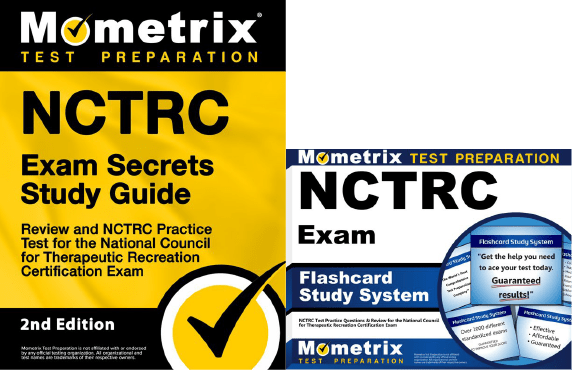If you need help studying for the NCTRC Certified Therapeutic Recreation Specialist (CTRS) certification exam or just want some more information about what the exam is like, you’ve come to the right place.
Click below to take a free NCTRC practice exam!
Exam Eligibility
Before you can register to take the NCTRC exam, you’ll have to meet the requirements of ONE of the following eligibility pathways:
Academic Pathway
- You need at least a bachelor’s degree with a focus in recreational therapy
- You need to complete a 14-week internship supervised by a CTRS
Equivalency Pathway
- You need at least a bachelor’s degree
- You need to complete specific recreational therapy coursework
- You need paid work experience that uses the therapeutic recreation process
If you meet one of these eligibility pathways, you’re set to begin the registration process!
What’s on the Exam?
First, let’s talk about the questions on the exam. There are 120 multiple-choice questions total, but only 100 of the questions will count toward your score. Why is that?
The 20 unscored questions on the exam are used to determine if they’re good enough questions to add to future versions of the test.
The trick is that you won’t have any way of knowing which questions are scored and which ones are unscored. They will all appear like scored questions throughout the test.
The time limit for the exam is 3 hours. There aren’t any scheduled breaks, but you’re free to take restroom breaks as needed.
Let’s take a closer look at the different sections of the CTRS exam.
1. Professionalism
12% of the exam
- Communicating with interdisciplinary teams
- Educating stakeholders about the scope of practice
- Advocating for the client’s rights
- Trends in RT/TR practice
- Cultural competence and intelligence
- Maintaining professional qualifications
- Participation in committees
- Compliance with the professional code of ethics and standards of practice
2. Assessment
19% of the exam
- Establishing a therapeutic relationship with clients
- Diagnostic and developmental characteristics
- Assessment tools
- Gathering primary data across functional domains
- Determining strengths and limitations
- Prioritization of client needs and strengths
- Creating goals and objectives
- Communicating assessment data
3. Planning
18% of the exam
- Utilizing RT/TR service models
- Theories of practice
- Aligning goals and objectives to support service delivery
- Designing programs based on client needs
- Logistical program planning
- Intervention techniques, approaches, and modalities
- Activity modifications
- Formative evaluation techniques
4. Implementation
25% of the exam
- Explaining the purpose of interventions/programs
- Implementing program services
- Establishing a facilitation structure and leadership approach
- Implementing a program plan
- Monitoring the effectiveness of an intervention or program
- Components of safety protocols
- Relevant precautions that provide a safe environment
5. Evaluation and Documentation
23%-26% of the exam
- Completion of progress notes
- Developing discharge/transition plans
- Communicating with interdisciplinary team/service providers
- Summative evaluations of program effectiveness
- Policies and procedures for reporting specific incidents
- Documenting specific incident details
6. Administration
10% of the exam
- Following the service plan of operation
- Adhering to agency policies
- Adhering to agency fiscal management
- State, regional, and federal regulations related to RT/TR services
- Contributing to staff performance appraisals
- Assisting with education and supervision of staff, volunteers, and students
- Maintaining the internship program
How to Register
Once you’ve ensured that you meet the eligibility requirements, you can register for the exam.
To get started, you’ll need to submit an application on NCTRC’s website. The application will ask you for your contact information and any documentation to prove your eligibility (among other things).
When you submit the application, you’ll also need to submit the testing fee, which is $325.
Exam Scores
The test is scored using a scaled scoring method. Here’s how it works:
You will need a score of 293 to pass the test.
The reason your raw score is converted to a scaled score is because everyone who takes the test is given a slightly different set of questions. Since everyone has a different arrangement of questions, and because some questions are harder than others, converting your raw score to a scaled score ensures a more even playing field.
Retaking the Exam
If you didn’t get a passing score on your first try, that’s okay! You can retake the test after a 30-day waiting period.
Keep in mind that you will have to pay the full testing fee every time you retake the test.
FAQs
How many questions are on the NCTRC exam?
The exam contains 120 questions.
What is the time limit for the NCTRC exam?
The exam is timed at 3 hours.
What is the passing score for the NCTRC exam?
You’ll need to get a final scaled score of at least 293 to pass.
How much does the NCTRC exam cost?
The testing fee is $325.



 NCTRC Study Guide
NCTRC Study Guide NCTRC Flashcards
NCTRC Flashcards